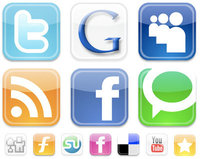
If you walk outside at the end of the day at any average high school, you will see students on their cell phone almost immediately. These students are not always checking for any new text messages, but checking to see if anyone has written on their Facebook wall, or if their favorite celebrity has updated their Twitter. On campus at many local colleges, students are found working hard on their laptops, but many might actually be updating their Tumblr or their MySpace profile. Social networking sites have taken over the lives of users across the globe, causing the term “social networking addiction” to be coined by mocking individuals. Teenagers and adults seem to have become obsessed with trading personal information about their social lives with their friends and family. According to a recent study, some are so obsessed with checking their Facebook, MySpace, Twitter, or all three, that 48% of those polled check these sites right when they wake up and 28% of iPhone users check before even getting out of bed. The popularity of these sites has skyrocketed in recent years, and they are quickly becoming substitutes for face-to-face communication.
Many adults and teenagers do not consider the large amount of time they spend on these sites as an addiction. According to research, however, any behavior which is able to cause an elevation in a person’s mood can be considered an addiction, and human nature can create an addiction out of almost anything. Although research has showed social networking as a possible addiction, people are quick to resent the idea because there is not a definite way to diagnose and treat the so-called disease. Some researchers even say that social networking is definitely not an addiction, but could be a symptom of other serious psychological conditions, such as depression, loneliness and anxiety. Adults and teenagers are quick to negate the idea of their possible social networking addiction because to them, an addiction is a habit created by the need to have more pleasure in their lives. The constant habit of this addictive pleasure then usually leads to negative feelings and shame, which then leads to a more habitual use of such pleasure, thus creating an addiction. Adults and teenagers do not find their use of Facebook, Twitter, MySpace or any other social networking site as shameful. They see it as a way to cure boredom, relieve stress and to keep in touch with others.
Although many people see social networking sites as cures to boredom and stress relievers, but not as addictions, there are many people who disagree and see a habitual use of these sites as a concern. To many an addiction is something created out of boredom or stress, and a regular need for this stress-reliever can lead people into a “downward spiral,” according to Meaghan Smith, a senior at Walpole High School. Many do not see why these sites have become so addicting at all—like Twitter for example. Numerous people do not see the enjoyment in updating millions of strangers on their every move throughout the day. “I do not find it addicting to constantly talk about your life in 140 characters” Smith says of this site, “People become addicted to [Twitter] because they think people want to see a quick play-by-play of their pointless lives, but no one really does.” According to another high school student, Bobby Gay, sites like Facebook “cause you to want to know more about people,” and you may end up feeling like you are constantly checking in on your friends and family. Researchers say there is a thin line between wanting to know what distant friends and relatives have been up to lately, and wanting to know where someone is and what they are doing at any given point in the day, and Facebook has started to blur those lines. To keep these lines from being completely crossed, and to keep the “addiction” manageable, society has created ways to help users quit the social networking habit.
Because high school students continue to avoid homework by updating their Facebook page, because college students continue to avoid studying for exams by scrolling through a Tumblr blog, and because ordinary people continue to avoid work and other priorities by tweeting about pointless occurences in their daily life, steps are being taken by society to cut back on the social networking “addiction.” In colleges across the country, professors are beginning to ban laptops during lectures to try and keep students from being distracted by social networking sites while they are supposed to be taking notes. Websites such as Facebook and Twitter are quickly being banned in many high schools and middle schools to prevent students from accessing the sites during school. Many businesses are also implementing regulations on such sites during work hours to keep employees focused on the work that needs to be done. Those who do not see social networking as an addiction find these solutions as unnecessary, but many others argue that supporters of Facebook, Twitter and MySpace may have clouded judgement, and could possibly use a break from these sites. Even if social networking is not yet an addiction for many users, the possibility of these sites as addictions is quickly becoming a frightening reality.









Alena • May 5, 2013 at 1:07 am
When was this article posted? :0
Habib al Hadji al Omar • Mar 21, 2012 at 7:21 pm
This social Network is absolutely addicting. I agree with that.